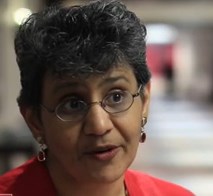User login
MIAMI – Physicians generally herald advances in medical imaging technology to improve and inform clinical decision-making for their patients. However, greater precision in MRI findings can leave physicians wondering how to advise patients concerned about a contralateral breast cancer, Dr. Anees Chagpar said.
It boils down to clinical significance and anxiety. Smaller lesions now detected by MRI may or may not indicate a true increase in risk, Dr. Chagpar said at the annual Miami Breast Cancer Conference, held by Physicians’ Education Resource. In addition, evidence suggests just having an MRI raises anxiety in some women with unilateral breast cancer, regardless of results. She advises providers to carefully consider why they’re ordering an MRI and the potential impact on a patient already at a heightened state of anxiety from their initial diagnosis.
Dr. Chagpar, director of the Breast Center, Smilow Cancer Hospital at Yale-New Haven (Conn.), reported no relevant financial disclosures.
The video associated with this article is no longer available on this site. Please view all of our videos on the MDedge YouTube channel
MIAMI – Physicians generally herald advances in medical imaging technology to improve and inform clinical decision-making for their patients. However, greater precision in MRI findings can leave physicians wondering how to advise patients concerned about a contralateral breast cancer, Dr. Anees Chagpar said.
It boils down to clinical significance and anxiety. Smaller lesions now detected by MRI may or may not indicate a true increase in risk, Dr. Chagpar said at the annual Miami Breast Cancer Conference, held by Physicians’ Education Resource. In addition, evidence suggests just having an MRI raises anxiety in some women with unilateral breast cancer, regardless of results. She advises providers to carefully consider why they’re ordering an MRI and the potential impact on a patient already at a heightened state of anxiety from their initial diagnosis.
Dr. Chagpar, director of the Breast Center, Smilow Cancer Hospital at Yale-New Haven (Conn.), reported no relevant financial disclosures.
The video associated with this article is no longer available on this site. Please view all of our videos on the MDedge YouTube channel
MIAMI – Physicians generally herald advances in medical imaging technology to improve and inform clinical decision-making for their patients. However, greater precision in MRI findings can leave physicians wondering how to advise patients concerned about a contralateral breast cancer, Dr. Anees Chagpar said.
It boils down to clinical significance and anxiety. Smaller lesions now detected by MRI may or may not indicate a true increase in risk, Dr. Chagpar said at the annual Miami Breast Cancer Conference, held by Physicians’ Education Resource. In addition, evidence suggests just having an MRI raises anxiety in some women with unilateral breast cancer, regardless of results. She advises providers to carefully consider why they’re ordering an MRI and the potential impact on a patient already at a heightened state of anxiety from their initial diagnosis.
Dr. Chagpar, director of the Breast Center, Smilow Cancer Hospital at Yale-New Haven (Conn.), reported no relevant financial disclosures.
The video associated with this article is no longer available on this site. Please view all of our videos on the MDedge YouTube channel
EXPERT ANALYSIS AT MBCC
